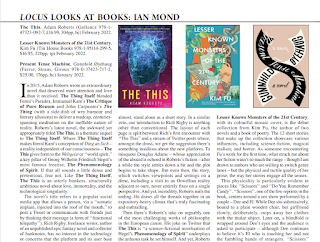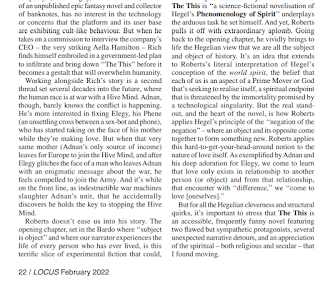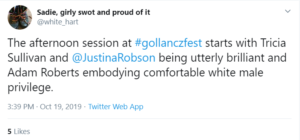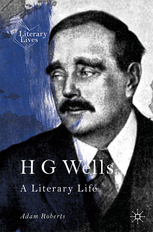Adam Roberts's Blog, page 4
February 12, 2022
Guardian on THE THIS
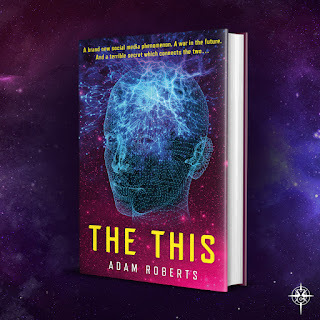
Today, The This reviewed in the Guardian. It's the second of my novels Lisa Tuttle has reviewed, and the first she has liked, so that's good.
Imagine a social media app implanted in the roof of the mouth for more immersive connectivity. This one small step turns out to be a giant leap in human evolution, a sort of telepathy that brings everyone together as parts of one vast, gestalt consciousness. But is that really such a great idea? Roberts takes a classic trope of speculative fiction, combines...
February 8, 2022
What does "The Times" (of London) think of THE THIS?

I'm afraid this blog will become a bit repetitive over the coming weeks, as I post various reviews of The This , good and I'm sure bad. But I can't pass over this Times review by Simon Ings, which picks it as their SF book of the month.
Book of the month
The This by Adam Roberts
The This is a new social media app. One that is injected straight into the body, so you can connect with other people without using technology. Its mass adoption leads humanity ineluctably to the creation of a hive mind-li...
February 7, 2022
What does Locus think of "The This"?
January 26, 2022
"The This": reviewed in SFX

The novel itself is published Feb 3rd, but reviews are already coming in. Click to embiggen. Five stars! Can't complain.
January 1, 2020
Twenny-twenny
Here, to quote the Chemical Brothers, we go. And what does 2020 hold, for me? Some books, one appearance, and otherwise a considered and proportionate, I think, public-profile autodeëmphasis. So it goes.
Bookwise, I'm talking about a non-fiction on the end of the world (working title, which the publishers may or may not wear for the actual publication: It's Nigh or Never) and a fiction title for Gollancz (working title, which the publishers may or may not wear for the actual publication: The This). The novel may appear late 2020 or early 2021. It is a hive-mind novel, divided between a near-future London-set storyline and a further-future US-set one, saying stuff about social media and identity and community. It's also a novelisation of Hegel's Phenomenology of the Spirit, a fact which will surely disendear it to any potential readers who were put off by the Kantian conceit of The Thing Itself, a book simultaneously my best work and biggest popular failure. The non-fiction work is about the end of the world.
Otherwise, I'm the fourth of four GoHs at Eastercon this year: an honour to me, and, I suspect, the easier gig of the four: attention will be on my three more famous and noteworthy fellow GoHs, allowing me to wander about, chat with people, and generally keep as low a profile as is consistent with GoHness. I shall be treating it as a vastly less flamboyent lower key Elton John Farewell Tour kind of gig, and am looking forward thereafter to a broadbrush policy of individual declination and general going-into-the-West.
I'm tinkering with some final revisions to The This as we speak, and blocking out another novel, perhaps to be called Purgatory Mount. And a happy new year to all.
December 24, 2019
Some 2019 Translations
It seems presumptuous of me, really, to style myself ‘a translator’. That's a honorable and important profession, and those who profess it have vastly better linguistic skills than I do. And yet I keep, in small and often piecemeal ways, returning to the business of translation, because I find it fascinating. At any rate I thought I might as well list what I've done in 2019.
First up was my translation of Finnegans Wake into Latin. This is available as an ebook via Amazon (only one review on that page as of posting this today, but at least it's five-star!). It's the whole Wake—not, as it might be, a few bits and pieces—and rendered into Latin throughout, except where Joyce originally wrote in Latin (there's quite a lot of that in the original text), which passages I translated into English. If you're curious as to why I have undertaken such a laborious, pointless and, we can be honest, crazy task, this old blogpost of mine explains some of the context, as well as laying out my praxis and other thoughts.
Sticking with Latin, here's my English rendering of George Buchanan's ‘Desiderium Lutetiae’ (1567). I needed to read this poem for an academic-y thing, and although there have been some English translations of Buchanan (he was once a huge figure, one of the giants of Renaissance European literature and culture, for all that he's forgotten nowadays) copies of these happened not to be in my University Library, and I wasn't willing to shell out what AbeBooks was asking just to be able to cast an eye over somebody else's rendering. So I gorblimeyed up an English version myself. It's a pretty interesting pastoral poem, I think; but, of course, I would say that, having investing the time in it, wouldn't I.
Otherwise, it's been a year of Old English. I've written a book-length sequel to Beowulf, called Beowulf in Hel, but (before you get excited) in alliterative verse. Writing this, I also knocked-out a translation of the original Beowulf as a sort-of companion piece. This I did a few years ago, and having done so I found, you will be utterly unsurprised to learn, that nobody wanted to publish it (I wrote it because it occurred to me I'd never written a Fantasy novel, and wanted to give that ago. It's pretty good, I think! BUT, you know. Alliterative verse ...)
Anyway: lately I've been going back to this project, polishing and so on, and it's gotten me back into Anglo-Saxon stuff. In the spring I did a version of The Seafarer, and in the autumn an English rendering of that old warhorse The Battle of Maldon.
“Heads be held higher, hearts shall be keener,
mood shall mount-up as our might lessens.
Here lies our leader all laid low,
a good man on the ground; all should grieve
to witness him gone away from this war-play.
I've lived long enough; I'll not leave this location,
but will stop here, stay with my slain sovereign:
beside my loved leige is where I'll lie down.”
It is, as they say, a Mood.
What I Wrote in ’19
Compared with some previous years 2019 has been not been so busy, publication-wise. If we limit ourselves (as why shouldn't we) to book-length work, then I published two things this year: [1] a novella called The Man Who Would Be Kling (Newcon 2019), cover art above, back-cover description here:
... and [2] H G Wells: A Literary Life (Palgrave Macmillan 2019).
That doesn't mean I haven't been putting stuff out there. It just means that most of my wordage has appeared in blogs. Sometimes this has been fiction (check out, for instance this short stort, a few hundred words long, that appeared on my Morphosis blog in November: ‘Goliath, David, Adam’. Or, you know: don't check it out. Entirely up to you). But most has been non-fiction.
More particularly, I have divided my 2019-blogging between three sites: my aforementioned Morphosis blog, which is a venue for various literary and cultural ponderings; my Samuel Taylor Coleridge blog, which is where I post stuff pertaining to, er, Samuel Taylor Coleridge; and for this year only, Gail Marshall, a professor at Reading University, set up a blog dedicated to a month-by-month re-read of George Eliot's Middlemarch, to mark the bicentenary of Eliot's birth. I contributed various posts to that joint project.
Now, in the normal course of things that would all slide inevitably into the backward and abysm of yesteryear, for who scours blogs for old posts? Who, we might wonder, even reads blogs these days? But yesterday I happened to read Neville Morley's post of his pick of ‘2019's best blog posts’. It's an excellent list, with links to some thoroughly absorbing and compelling reads, and I don't just say so because he includes a couple of mine in there. But it did prompt me to draw up a list of what I'd say are my ten best blogposts of 2019.
And here they are, in order.
10. ‘Lord of the Sommes’: a reading of Lord of the Rings as a (late, since it was published in the early 1950s) example of World War 1 literature. I'm not entirely sure of this piece, to be honest, even though Neville M picks it as one of his blogs of the year. I worry it strays into the marshlands rather with its discussion of Literary Modernism and ends on some not-quite-completed lucubrations on memory. But one of the things I've been doing over the last couple of years is labouring to bring my thoughts on Fantasy as a mode into some kind of order, perhaps with a view to writing a critical book (probably with a friend) on the topic, and this takes its place in that.
9. ‘Coleridge's Greek Ode: "Against The Slave Trade" (1792)’ I wrote this post to get closer to Coleridge's rather maligned 1792 ode in ersatz Sapphic Greek. I make no claims for my English translation of this, but this blog did at least convince me that there's more in the Ode than critics generally admit.
8. ‘Middlemarch chapter 6: Sappho's Apple’ This is a small thing, but it pleased me: nobody had tracked down the reference Eliot makes to ‘Sappho's apple’. I did, and rather liked what I found.
7. ‘Middlemarch chapter 38: Hypocrisy and the Judgment of Men’ A rather more substantial Middlemarchian investigation, I think, in which tracking another untracked-down allusion leads to a more critically weighty discussion of the novel.
6. ‘As Green As Emerald’. I'd long been puzzled why Coleridge's Ancient Mariner describes the icebergs he encounters on his voyages as green, of all colours. In this blogpost I finally scratched that critical itch.
5. ‘Brave New World and Social Stratification’. This is a post on Huxley's novel, including something in its worldbuilding I'd not noticed before.
4. ‘Star Wars: Crash 2’ In which I argue that there is more in common between the Star Wars franchise and Ballard's perverse masterpiece of masochistic car-philic erotica Crash than is generally grasped. My recent viewing of Rise of Skywalker has not altered my opinion where the thesis of this blogpost is concerne.d
3. ‘Fantasy Mythography of WW1: the Case of Robert Graves’ This one is closer to my heart than the more general Tolkien/WW1 discussion listed above as No.10. Perhaps for that reason I over-value it. But I think this says more penetrating, and more original, things than the other blog, and about a writer much less widely read or studied.
2. ‘Eliot's Double Mirror’. This is the best of the dozen-or-so blogposts I wrote this year on Middlemarch, I think. It says some things about the novel that are true, and better than that opens up (or I think it does) a whole avenue of future investigation. Pascal was a really, really important writer and thinker for Eliot, and it surprises me that more work hasn't been done unpacking the implications of that. Perhaps I'll do some of that work, myself.
1. ‘The Fix-Up’. This gets my personal vote as my best blogpost of the year. Again, I may be over-valuing it because, as I say in the blog, the ‘fix-up’ is of peculiar fascination to me as a reader and, more to the point, as a writer. But I'd still say this blogpost says some original things, and manages not, as too many of my blogs do, to sprawl.
A couple of other posts are, as the phrase goes, bubbling-under. I think this post on Lydgate and the textual strategies of realism is saying something interesting and new-ish, but I don't know the secondary criticism well enough to be sure. I was quite proud of this new translation of the OE poem ‘The Seafarer’ of mine (but perhaps translations, of which I've posted a number this year, deserve a separate post); and I debated with myself whether to include this, the longest of my year's blogpostery, in my top ten: it starts by discussing Jordan Peterson's 12 Rules For Life book, segues into a discussion of Barrie's Peter Pan, and tries to align the two in a frankly over-reaching general theory of life the universe and everything. I didn't in the end include it in my ten, because it's way overlong, certainly broken-backed and I'm not sure it's, well, right actually. But it may be right, and if it is I'm on to something I should definitey write more about. But as actual blogposts, better are these two much more controlled and proportionate essays from my Coleridge Blog: ‘A Flash of Lightning’ and ‘Waterfalls and Silence’.
And Without Wells, How Would We Drink?
Now published. The back cover includes two generous blurbs, from Steve Baxter and Patrick Parrinder (click to embiggen):
It was a long road, the writing of this book; and although it is, in some ways, quite an unconventional biography I'm quite proud of it nonetheless.
November 24, 2019
On Being Cancelled
Cancel-culture is one of those bait phrases, liable to provoke strong and often unconsidered reactions, especially on the political right. Bearing in mind what I am about to say here, I should begin by stressing: MeToo has been, manifestly, necessary and salutary, part of a still largely incipient but growing and important rebalancing of the polity, addressing questions of male privilege and female marginalisation and oppression that have defined society and culture since the memory of man (and woman) goeth not to the contrary. Increasing numbers of women finding the courage to speak out is a patently good thing, and I very much take the force of the argument that says: now is a time for men to listen and digest rather than to continue monopolising the discourse. That might look ironic, given that this post is me blathering on about me, but I’m hiding this text in the decent obscurity of this website, will not link or promote it, and will disable comments. [In the event, after writing it I left it sitting in the draft folder for many weeks, unsure whether to post it at all, and will probably delete it soon.]
Cancelling, then, is a real phenomenon, although still a pretty unusual one I’d say. It happens on two levels. Where somebody has actually broken the law, as (let’s say) Harvey Weinstein clearly has, it can be a proper take-down, such that the perpetrator’s entire professional lives become no longer viable and the cancelled one must withdraw from the public eye altogether, perhaps to jail. But more common are those occasions where somebody has done something not illegal but offensive, and one or more public platforms that previously hosted that person withdraws their support. Often in such cases, the person, though deprived access to some media outlets, continues their career elsewhere. Louis C.K. pressured fans into watching him masturbate, which is gross but not imprisonable. He no longer has the career he once had, and many outlets won’t host him. But he still has a comedy career. The Right talk about ‘cancel culture’ as if it were equivalent to being marched handcuffed into the killing fields and shot in the back of the head by some Woke shrillster, but, evidently, it’s not. To counter the claim that ‘MeToo ruins men’s lives!’ one need only point to the current President of the United States, or indeed his most recent appointee to the Supreme Court.
I know whereof I speak, because I have myself been cancelled. I used to review for Strange Horizons, an excellent online venue for SF original writing and reviews. I was proud to be associated with the site, which does a lot of really good work (plus it’s hard to find paying venues for reviews and I do need the money). I can’t remember how long I wrote for them. Over a decade certainly. At any rate, early in 2018 they asked me to review The Last Jedi, which I did, at length: more a review-essay than a simple review. As part of this piece, and by way of discussing the extent to which the movie engages in a kind of informed and often canny fannishness with respect to its own franchise, I spent a paragraph talking about how much these movies have meant to me personally. I was 12 when the first Star Wars came out, saw it three times at the cinema on its initial release (bunked off school one afternoon for one of those). I mentioned how overwhelmed 12-year-old me was by the scale of the flick, the special effects, the adventure, the sense of wonder, and how big a crush 12-year-old me had on Carrie Fisher. When the review came out some on Twitter objected to it, deploring that SH had published a review by a male reviewer who had, as one person put it, ‘allowed his dick to get in the way of talking about the movie’. (I should say: the review at no point actually mentioned my penis. But you see what they meant). The response by the SH editorial team was swift: they cut the offending paragraph from the review and issued a fulsome public apology to all and anyone who had been upset or offended by what I had written. There was a spike in my twitter activity, people @-ing me to deplore to my face what I had done. To some of these I responded, I hope courteously, but in the event evidently not apologetically enough, since the replies were either still cross or else condescendingly dismissive, ‘I see you still refuse to accept what you’ve done wrong cool cool’ and the like. This was all very upsetting and unpleasant for me, but it is not in the logic of cancel culture to acknowledge the personal distress of the individual being cancelled. The more proper reaction will be something along the lines of ‘well you should’ve thought of that before you wrote these gross and hurtful words’ or ‘performed those offensive and upsetting actions’ or whatever it might be. That is to say: you’re hurting? good, you deserve it. I no longer review for Strange Horizons.
This wasn’t the end of the world. Indeed, I have to admit over the last two years not one person has said to me: ‘didn’t you used to review for SH? It’s a shame you stopped’ or anything like that, so manifestly I’m not missed. So it goes. More, I still do review for other venues, so it’s not the case that this extirpated my entire reviewing career. As I say, total scorched earth is not, usually, how cancel culture operates. Of course the whole business was upsetting for me, but if it results in even one male critic not writing about how they had a crush on a movie star when they were twelve then, I guess, it’s a price the larger community is happy to pay.
The thing is I am, in my middle-aged straight white male way, ‘woke’. It's kind of odd, me saying so I know, but there we are. I recognise the injustices that these strategies exist to address. Liberation from generations of structural sexism (not to mention racism and homophobia) is a patent social and cultural good, and while such liberation neither is nor should be in the gift of white men, white men can and should be allies of those fighting the fight. I have, I hope, tried to live my life according to those principles. The personal is political: I would call myself a feminist, and am certainly married to one. I undertake half the housework, cleaning and cooking at home, and we share the business of raising our kids equally with one another. I support my wife’s career (as she does mine) and together we have brought-up our kids not to be sexist, racist, homophobic etc. What you’d expect any reasonable couple to do.
But the professional is also political. I believe genuinely that we need more diverse voices in culture, and in my small corner of it, SF, I do what I can, given the frankly crushing pressure of a full-time day-job, and a writing career, and family-life and so on. My day-job is teaching English and Creative Writing to UG and MA students. I don’t get paid extra for supervising PhDs (which is to say, I wouldn’t lose any salary if I just refused to take on PhD students—several of my colleagues do just that) but it seems to me a good thing to do, especially where female and POC students are concerned, so I have a lot. In the SF world I have followed Paul Cornell's prompt to refuse to appear on all-male panels. I use social media to promote others’ work more than I use it to promote my own (of course, if I only did the latter, people would unfollow me for spamming them). On a personal level I went through a disheartened phase a few years ago over the fact that my stuff doesn’t win awards or garner other signs of community esteem—my early books were sometimes award-nominated but didn’t win; my later stuff doesn’t even get nominated—but I do take genuine pleasure in seeing SFF’s awards, overall, rewarding a greater proportion of women and POC writers, beginning to right a historic representational wrong. That’s as it should be. Plus of course I’m aware that for many people ‘fewer awards to straight white dudes!’ is a net positive all round. I mean, I can’t help the fact I’m a straight white dude; it’s not something I actively chose. But it’s of course possible to take a larger view. That said, doing so has sometimes resulted in me making an ass of myself. A couple of years ago, via a friend, I got wind of a rumour (true or otherwise) that my name was one of several being batted around in a Pilgrim Award context. It would be a great honour to win a Pilgrim of course, but it can’t be denied that the award's honour roll contains few women, and fewer still POCs. I mentioned to my friend that, though of course it would be a wonderful honour if etc etc, maybe the next howsoevermany years the award ought to go to non-white non-men? A ticklish business this: the administrators are liable to think ‘who does he fucking well think he is?’ Rumours are only rumours, and maybe I was never in the frame at all (and even if I was, maybe all I’ve done is piss off the prize administrators such that the award will still be awarded to the occasional white dude just not me). At the time I thought I was trying to do the right thing, but I concede it might actually have been not only foolishness on my part but that specie of vanity that pretends to anti-vanity. At any rate, it's a safe bet I shan't be winning a Pilgrim in the to-come.
Luckily there are more positive things one can do. For example, I have twice been a judge for the Kitschies, the SFF award that aims to reward excellence in genre diversity. It’s a pretty laborious business, award-judging: reading literally hundreds of novels in shortish-order and liaising repeatedly with your fellows judges to whittle down a longlist, shortlist and winner, all very time-consuming, draining, unpaid. But it is worthwhile and I’m glad I did it. Quite apart from anything, on that second stint it gave me a reason to go into London for judging meetings and thus to hang out with the award chair, my friend Glen Mehn, in the last months of his life. I used to blog a lot of SFF reviews but, when my workload elsewhere became too overwhelming to keep that up I stopped. Lavie Tidhar emailed me suggesting I carry on, but shifted to reviewing and promoting only non UK/US fiction. It was a good idea, and I genuinely considered it, although I the end I just couldn’t commit the time. Conceivably it might be worth going back to it, if my other workloads ease up. In the meantime I go on, offering help where I can behind the scenes, reading manuscripts, writing prefaces, offering advice or blurbs, connecting people and the like, and I try to do that particularly for women and non-UK/US writers. I’m not much of an insider really, publishing-wise, and there’s a limit to what I can do. But where it’s possible, I try.
I can imagine people thinking: what do you want, a medal? Which is quite right. All this ought to be the default for any right-thinking person. Ideally it would become a set of interlocking and unconsidered habits. I’m no saint, though, and sometimes the thought occurs to me: what’s in it for me? Even posing the question looks venal, but it’s worth thinking about, I’d suggest, in a larger sense. One answer is: ‘if resisting sexism and promoting diversity leads to a less sexist and more diverse society then everybody, including you, benefits!’ But though I daresay I am an egoist, as many men are, I’m not enough of an egoist to believe that the things I do will have such revolutionary and large-scale effects. So why, then? ‘You should just do it because it’s the right thing to do, not because you expect to be rewarded’ is the more penetrating answer (the less-snarkish version of the what do you want, a medal? line) and, I suppose, it’s the one that sustains me, however spotty my efforts are in this respect. Proper old-school Kantianism. But I don’t see that this is an entirely strategically practicable in a larger sense. It is often said, and I think correctly, that for any given group—old straight white dudes, say—who have enjoyed privilege for a long time, any reduction in that privilege, howsoever small or symbolic, feels like oppression. It’s not oppression, but people act, and vote, on how they feel about things not on how things objectively are. So telling that tranche of society ‘you should make room for more women and POC simply because it’s just the right thing to do’ may not be as effective at persuading those people to change their minds, and their modes of living, as we might hope.
Anyway, this is my life, the smallest of small beer. From time to time I am rebuked, people are judgmental and so on, and usually I suck it up. Many people have it a lot worse than I do. It's cumulative, though. Some weeks ago I did GollanczFest 2019, a one-day, Saturday event. The morning portion was a long session in which a dozen authors offered writing and publishing advice to a dozen small groups, moving, when the gong sounded, from one table to another, from one huddle of eager wannabe writers to another, fielding questions, asking them about their projects, giving advice and so on. Golly charged punters a fee for this, although none of the writers taking part were paid—or I wasn’t, anyway (maybe the bigger names were coaxed to appear with money, I don’t know). But that’s fine: good to spread the love a little. It wasn’t a particularly ego-stroking experience for me, since none of people I spoke to knew who I was (‘have you published anything then?’) but, you know: I’m not famous. I write at the literary, and sometimes pretentious-literary, end of SF, and some of my stuff is quite rebarbative, so it was never going to trouble the bestseller lists (of course, it’s also possible what I write doesn’t trouble bestseller lists because it’s shit). Still: they were all nice people. Then was lunch. Then we went over the road to Foyles’ event space on the top floor where I appeared on a panel with three other writers to talk about ‘writing outside the box’: Tricia Sullivan, Justina Robson, Mark Stay and me. The room was packed.
I’ve done plenty of these kinds of panels in my time, although in retrospect this appearance was, by quite a long chalk, my least enjoyable. Writing outside the box: OK. Well, I ‘write outside the box’ for aesthetic reasons, because it’s the kind of writing that interests me, although I’m of course aware that it turns off plenty of readers. Mark Stay, who was sat next to me, writes accessible, readable, enjoyable stuff to which readers flock, and that’s great. I certainly wouldn’t tell anybody what to read. But the panel was about our writing praxis. Tricia Sullivan talked about her commitment to Extinction Rebellion, and how she considers the looming climate disaster the real issue right now. I think she’s right, and said something about how we tend to think of Nature as a god, vast and untouchable, and how we ought to stop doing that. It’s hard though. People by and large aren’t hurrying-on climate disaster out of sheer evil, or nihilism, or even out of selfishness. They’re just carrying on doing what they’ve always done, mostly concerned with the tangle of their day-to-day. It’s the collective inertia that is the problem. If I write stuff that’s rebarbative, then maybe that’s from a sense that we tend towards complacency, and from a related belief that it’s worth at least trying to shake up complacency, if only a little, not least in this environmental context. Sullivan said: life is often so ghastly, people should not be shamed for their comfort reads. There’s nothing wrong with reading for fun. People in the room cheered. ‘Adam,’ she said, ‘when you say “we are complacent” who are you talking about? Who’s “we”? Affluent white men? Lots of people don’t have it as good as you, Adam. I think maybe you should check your privilege.’
The room burst into spontaneous applause.
I didn’t reply, of course. Anything I might have said would have come over as me wriggling and kvetching about being called on my privilege. So I just sat there, stung and trembling and miserable, for the remaining duration of the panel. There’s no doubt, as Twitter later reminded me, what the audience in the room saw: a smart, articulate, principled woman taking down a fatuous old reactionary dude.
This doesn’t even count as a cancellation, of course. It’s just the give and take of a healthy public discussion: the very acme of the freedom of speech old reactionary dudes so often insist they favour. I’m a big boy, nobody forced me onto the panel. And people are manifestly hungry to see smart articulate women taking down old privileged men in public. I understand that. Still: on the train home that evening I felt very low. I steer clear of the word ‘depressed’. I had long stretches of chronic depression in my teenage years, through my 20s and into my 30s—my doctors tried various anti-depressants without success, and I just about endured, through suicidal ideation, prolonged feelings of despair, and the failure of my first marriage (my fault and largely to do with this default mood of mine). I should add, and it is one of the great blessings of my life, that I have not been depressed now for two decades. I don’t know why, after plaguing me so long, this disease went away in my 40s and 50s, although I am, I promise you, very glad it has. At any rate, it means I tend to avoid using ‘depressing’ in a throwaway manner. But being free of that debilitating sickness doesn’t mean one never feels unhappy, of course; and though there is, believe me, a substantive difference between feeling chronically unhappy and being depressed, being chronically unhappy still sucks. Perhaps now might be a time for a touch of what they call, though the phrase smacks a little to me of idulgence self-care. ‘What do you want, a medal?’ is fair enough, as a retort; but ‘what do you want—not to feel like shit?’ seems to me to approach inarguableness. Looking after myself is my responsibility, not anybody else's. I can't help the fact that I'm a straight white dude, but I suppose I can help the manner in which I curate the public side of my straight white dudishness. Life goes on. It won't miss me if I take something of a step back.
August 30, 2019
August News
News? There isn't any.
Still, that doesn't mean I ought to neglect this website. So where am I? Well: awards season is behind us now, and, alas, nothing I published in 2018 (three novels, including The Black Prince, manifestly one of the best things I've ever done; plus various short stories and novellas, non-fiction etc) was so much as shortlisted for any award. That's the fourth straight year in which I can make that melancholy claim; though it's, of course, only melancholy for me personally, and has no larger meaning or significance. What else? I spent a chunk of the summer putting the finishing touches (which here means: attending to edits and copy-edits and doing some final polishing) on the forthcoming H G Wells: a Literary Life, slated for a 13th November 2019 publication date. I feel I should have a large scale jpeg of the cover for this but all I can find is this tiny thumbnail. Let it suffice!
This was a project that grew in the writing, and ended up being about twice as long as Palgrave commissioned me. I wanted it to be comprehensive, and to discuss the whole run of his fiction and nonfiction (there's never been a book that does this) and, well, the bugger wrote a lot. It's a monster, I don't mind telling you.
Beyond that: I've written a new novel, The This, about hive-minds and Hegel; it's currently with my publisher although I've yet to hear from them if they want it or not. I've also been working on a short book about representations of the end of the world, for a different publisher, which is nearly done. Beyond that? Day follows day. You know how it goes.
Adam Roberts's Blog
- Adam Roberts's profile
- 558 followers


